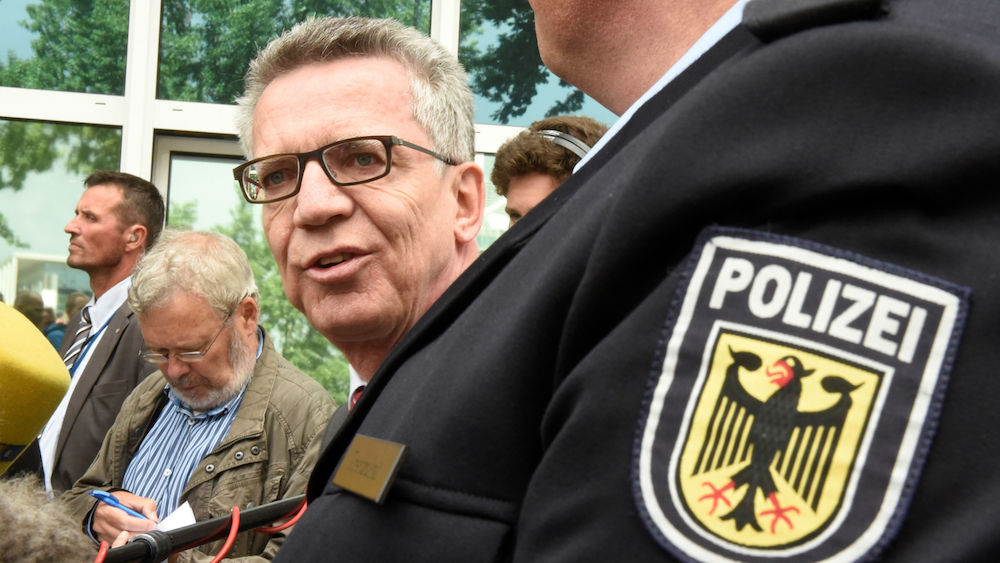Due to Germany’s federal structure, there are more than thirty bodies involved in keeping the country safe. After the terrorist attack on a Berlin Christmas market – the attacker was known to the authorities, but slipped through the net – Interior Minister Thomas de Maizière wants to change this.
There’s an amusing German saying: “Success has many fathers, but failures are orphans.” You can see this saying in practice when there is a big disaster in Germany: a mass shooting, a plane crash, or, as last month, the biggest attack linked to the so-called Islamic State (IS) in Germany to date – on a Berlin Christmas market – that killed twelve.
The bigger the disaster, the more crowded the post-mortem press conference. For an hour, sometimes longer, two sets of state and federal authorities – police, criminal police, prosecutors, and sometimes even politicians – jostle for journalists’ attention and explain why the others – not them – were responsible for what has happened.
Germany is a big country of 80 million people but it also has over thirty, largely decentralized, bodies involved in keeping its citizens safe. This federal approach is the most lasting legacy of the Nazi era, a far-sighted response to a criminal dictatorship that held all power in one hand and dragged Germany into the abyss.
Thanks to the Nazis, central government has little power in preventing and fighting crime. In modern Germany state police do most of the police work while federal police – the Bundespolizei – are mostly preoccupied with securing train stations, airports, and border areas. The Bundeskriminalamt (BKA) is Germany’s FBI equivalent, but has comparatively few powers to take over an investigation. And the federal domestic intelligence agency, the BfV, is largely reliant on the goodwill of 16 state intelligence agencies to share information.
This is how Germany has worked for the last 70 years. But do things have to stay this way forever?
Germany’s division of labor – and all the egos, turf wars, and information withholding that result – mean that, if you are a criminal with big plans in Germany, the easiest way to escape detection is to live on the road. That’s what the three-member neo-Nazi NSU group did, killing ten and escaping detection for a decade because various state and federal investigators never pooled their knowledge.
The NSU revelations were a massive failure of the federal approach. And federal Interior Minister Thomas de Maizière, fearing IS will exploit this decentralized structure, has proposed the most far-reaching overhaul of German law enforcement since the foundation of the state. “We are used to a normality and the absence of catastrophes. Our country is organized this way,” he wrote. “But times change and there many rules are lacking in Germany that are self-evident in other democracies.”
His proposals, made in a lengthy newspaper article last week, follow revelations that not all information about the main suspect in the Christmas market attack was shared among all authorities who should have known. This has to change, the federal minister says. He wants centralized bodies to deal with cyber-attacks and national emergencies, pointing out that, if disaster strikes, the population would have “no understanding” for the lack of such bodies.
His most radical proposals, though, were to lift domestic deployment ban on the army, another post-war safeguard, and to fold Germany’s 16 state intelligence agencies into one federal entity.
Shadows of the Past
Anticipating the kerfuffle his proposals would stir up, de Maizière said that restrictions devised in the shadow of Germany’s fascist past were no longer timely in the modern era of trans-national crime. “Debates in previous eras might have been understandable,” he said. “Now they are no longer so.”
But it wasn’t long before the status quo defenders – the state politicians who have the most to lose under these proposals – came out in force. Germany’s unique system has served the country well. And France, with its long series of terrorist attacks, suggests that centralization is not a guarantee of greater security. State leaders insist that improved information-sharing – not centralization – is the best answer to new threats.
De Maizière’s proposals are clearly partly electioneering, to reclaim the law and order agenda for Chancellor Angela Merkel and her center-right Christian Democratic Union (CDU). But this is also an opening gambit, a test of strength between Berlin and Germans’ traditional suspicions of central government. In the face of a rising Islamist threat, old fears are dwindling and, with it, the most extreme elements of post-war German federalism.
No one expects radical change soon. After all, no bureaucracy abolishes itself, particularly not with German state grandees who know they cannot be forced to hand over competences to central government.
Weeks after the Berlin Christmas market attacks, however, Germany’s Minister of the Interior has thrown down the gauntlet to his state colleagues and posed citizens a challenging question: What are you more afraid of? A slip back to old Nazi terror or a slide into a new era of Islamist violence, potentially exacerbated – unwittingly – by German decentralized policing?







